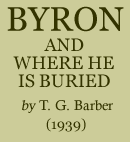< Previous | Contents | Next >
Preface.
“Of the making of books there is no end.” That Solomonic statement is true when applied to books about Lord Byron. I can well imagine the reader exclaiming: “What! another book about Byron?”
Yes, but a book that is different from others, and one which fills a gap in Byronic literature. For despite the scores of Lives, Sketches, Memoirs and Studies, we have not yet got the real Life.
Even if we had the Diary so deliberately destroyed, we should not have a real biography.
I said this book is different—it is more, it is unique, for it gives a detailed account of his ancestry, and the environment of his formative years, without which the reader might easily form a misconception of his character. It is unique also in this, that it could have been written by no other hand—no other man has such wealth of knowledge of the poet’s history—for the author has not only been the custodian of the poet’s tomb and relics for thirty years, but has had the confidence of the owners of Newstead Priory, and is the possessor of secrets not all of which are revealed in this book. In this fact lies the reason for the book’s appearance, for countless pilgrims from all countries visit the shrine of genius, many of whom are ignorant of the poet’s life, and are drawn thither mainly from familiarity with his classic pieces committed to memory in school days. To such this well-condensed book will be invaluable both as mentor and memento, and no shelf of Byroniana will be complete without it.
The genealogical chapters will throw light on his character, while the enthralling account of the excavations in the vault contains something of the epic spiced with the gruesome, but every reader must admire the thoroughness with which it was carried out, and because it kills certain local legends, it gives the book an added value.
The author has wisely refrained from any criticism of the poet or his works, for while he is more than most men aware of Byron’s weaknesses, he is also conscious of his superlative gifts, and over all he has spread the mantle of Christian charity; nothing is set down in malice.
Byron was the prime poetic force of the nineteenth century and his inspiration is easily traced in the early poems of Browning and Tennyson, but to my mind his prose takes higher rank, indeed I could wish him living: at this hour, for from the fires of his liberty-loving soul and with his lord-ship over language, with what scorn would he lash the sham Napoleons of our day!
A great literary giant of the last century said that “Byron was master of the finest prose in our language.”
This book has a modest price; its value cannot be fixed in figures.
It is copiously illustrated by recent photographs.
George H. Nettle.
Whyburn Lane,
Hucknall.
